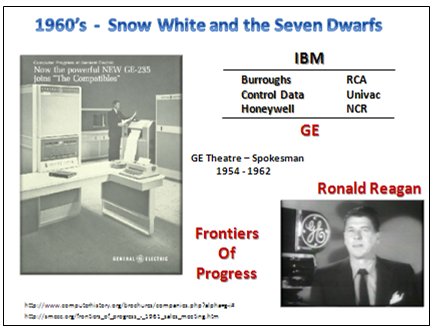|
program that was used as a
platform to sell GE’s products and vision. Reagan
worked for Lemuel Boulware at GE. During World War II,
Boulware was Vice Chairman of the War Production Board
(WPB).[2]
The purpose of the WPB was to convert civilian industry
to war production and to manage war material
procurement. Propaganda was a major component of
wartime production. It was used to build support for
the war effort – telling people what they should think
and how they should act[3].
In 1945, Boulware was hired by GE to be head of their
affiliated manufacturing companies for his expertise in
management. “He was the author of two books. The first,
“The Truth About Boulwarism” (1969; Bureau of National
Affairs”), using General Electric as an example,
dealt with measures that business executives and their
companies could use to gain public confidence and with
steps to help workers understand business economics”.[4]
About 25 percent of Reagan’s time with GE was spent
touring GE factories, finding out about the employees,
their beliefs, desires and fears. At the same time, he
promoted GE’s policy of communicating business economics
wrapped in the kind of folksy, old-fashioned Americanism
that made Reagan one of the most popular public figures
in American history. Ronald Reagan is quoted as saying
about his time at GE: (it was) “a post graduate course
in political science for me. I am seeing how Government
really worked and affected people in the grass roots of
America, not how it was taught in school.”[5]
Frontiers of Progress refers to a GE Sales Meeting in
Apache Junction, Arizona where Ronald Reagan gave a
speech[6]
where he said, “Webster has defined a frontier as: An
advanced or not fully explored region through
accelerated improvements of its present products and
their related facilities, and through added research and
development. General Electric recognizes the computer
business is an exciting frontier. The traditional
pioneering efforts of the Company in this field have
already resulted in dramatic new technologies”.
[2] New
York Times, Joan Cook, November 8, 1990,
Obituary, Lemuel Ricketts Boulware, 95;
Headed Labor Relations for G.E., http://query.nytimes.com/gst/fullpage.html?res=9C0CE7DA133BF93BA35752C1A966958260
[5] GE
website, Celebrating the Centennial, Ronald
Reagan & GE, Progress Reports, GE Theatre at
the Reagan Museum Opens, http://reagan.geblogs.com/ge-theater-at-the-reagan-museum-opens/
[6]
Southwest Museum of Engineering, Communications
and Computation, General Electric, Museum
Archive, Frontiers of Progress – GE Computer
Division,
http://www.smecc.org/general_electric.htm
National Sales
Meeting Agenda, http://www.smecc.org/frontiers_of_progress_-_1961_sales_meeting.htm
|

